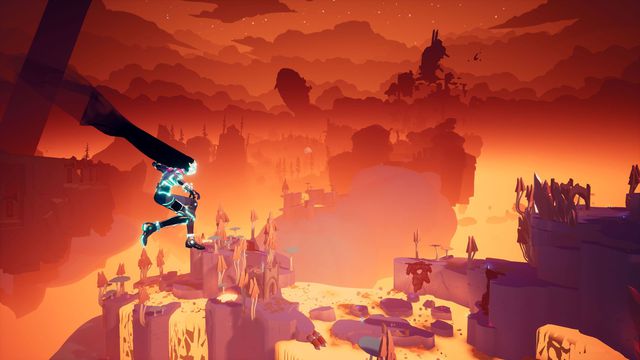Solar Ash and The Pathless are defining a new kind of open-world game

Blame the job or my memory, but I tend to take notes when I play games. And as I played Heart Machine and Annapurna Interactive’s Solar Ash over the past few days, those notes devolved into a list of ways the game resembles another Annapurna game: The Pathless.
Both are open-world games on a budget, prioritizing platforming challenges and fast, smooth movement over combat and custom story missions. In Solar Ash, you slide around on futuristic roller skates, boosting and grinding in every direction; in The Pathless, you propel yourself forward using a magical bow and arrow. Both games feature environmental puzzles, highly vertical areas, masked characters, and giant bosses, with a loose narrative wrapping all that together.
Both, at their core, take place in relatively empty open worlds and fill their space with unique forms of movement rather than endless amounts of content, and that simplicity allows you to appreciate the environments without feeling overwhelmed. They don’t feature crowds or a wide variety of enemies. In fact, they’d probably work without anyone to fight. Play through either game, and it often feels like enemies aren’t there to add to the story so much as to signal that you’re going in the right direction. (At least, until you get to the bosses.)
:no_upscale()/cdn.vox-cdn.com/uploads/chorus_asset/file/23061250/The_Pathless.jpg)
A scene from The Pathless.
Image: Giant Squid/Annapurna Interactive
I imagine there are budget issues at play here, as Heart Machine and The Pathless developer Giant Squid employ far fewer people than the studios that make high-end open-world games, and it takes less time to create fewer enemies, to design fewer quests, to animate fewer faces. Neither of these games comes anywhere close to the level of animation in something like Insomniac’s Spider-Man games. But whatever the impetus, the result is working for me. The lack of excessive stuff in them — and what their respective developers have done with movement, platforming, and world design to fill that void — is what I like about them.
They’re not overwhelming. They don’t contain hundreds of hours of content. They give you a sense of exploration and adventure, they say thanks, and they let you feel satisfied so you can move on to the next game. They’re big enough to get lost in, yet small enough to keep you focused. And they’ve allowed me to enjoy open-world games in a way that I haven’t been able to with a lot of big-budget stuff in recent years.
Source: Polygon.
About the game
Solar Ash
- Release date: December 2, 2021
- Developer(s):
- Publisher(s):
- Game mode(s):
- Platform(s): PlayStation 4, PlayStation 5, PC (Microsoft Windows)



Comments
Log in to your account or create one for free on MG Community to participate in comments.